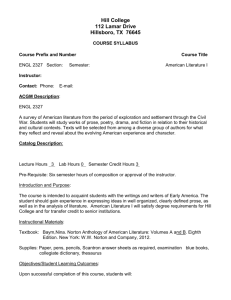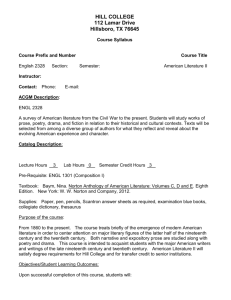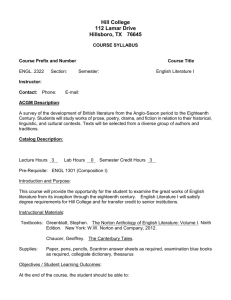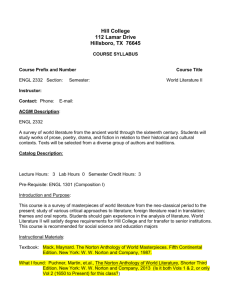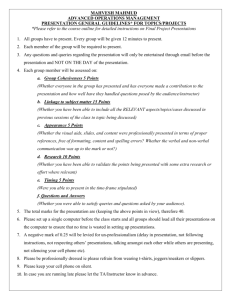British Literature II
advertisement
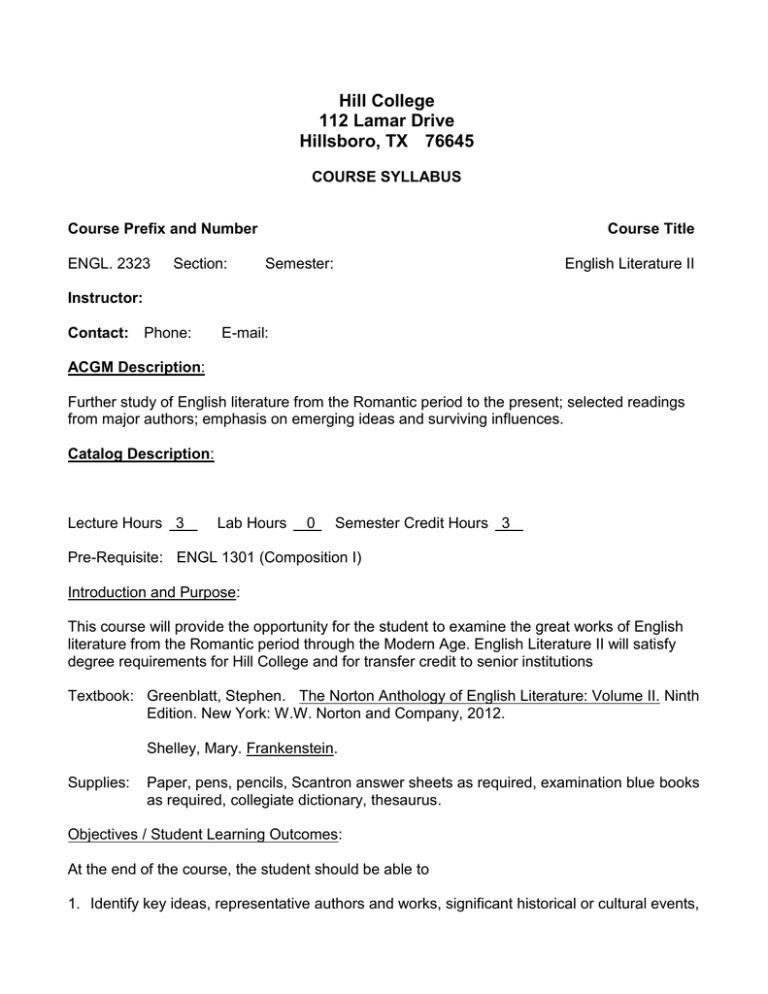
Hill College 112 Lamar Drive Hillsboro, TX 76645 COURSE SYLLABUS Course Prefix and Number ENGL. 2323 Section: Course Title Semester: English Literature II Instructor: Contact: Phone: E-mail: ACGM Description: Further study of English literature from the Romantic period to the present; selected readings from major authors; emphasis on emerging ideas and surviving influences. Catalog Description: Lecture Hours 3 Lab Hours 0 Semester Credit Hours 3 Pre-Requisite: ENGL 1301 (Composition I) Introduction and Purpose: This course will provide the opportunity for the student to examine the great works of English literature from the Romantic period through the Modern Age. English Literature II will satisfy degree requirements for Hill College and for transfer credit to senior institutions Textbook: Greenblatt, Stephen. The Norton Anthology of English Literature: Volume II. Ninth Edition. New York: W.W. Norton and Company, 2012. Shelley, Mary. Frankenstein. Supplies: Paper, pens, pencils, Scantron answer sheets as required, examination blue books as required, collegiate dictionary, thesaurus. Objectives / Student Learning Outcomes: At the end of the course, the student should be able to 1. Identify key ideas, representative authors and works, significant historical or cultural events, 2. 3. 4. 5. and characteristic perspectives or attitudes expressed in the literature of different periods or regions. Analyze literary works as expressions of individual or communal values within the social, political, cultural, or religious contexts of different literary periods. Demonstrate knowledge of the development of characteristic forms or styles of expression during different historical periods or in different regions. Articulate the aesthetic principles that guide the scope and variety of works in the arts and humanities. Write research-based critical papers about the assigned readings in clear and grammatically correct prose, using various critical approaches to literature. Description of Institutional Core Objectives (ICO’s) Given the rapid evolution of necessary knowledge and skills and the need to take into account global, national, state, and local cultures, the core curriculum must ensure that students will develop the essential knowledge and skills they need to be successful in college, in a career, in their communities, and in life. Therefore, with the assistance of the Undergraduate Education Advisory Committee, the Coordinating Board approved a 42-semester credit hour core curriculum for all undergraduate students in Texas, including a statement of purpose, six core objectives, and common component areas. Statement of Purpose Through the Texas Core Curriculum, students will gain a foundation of knowledge of human cultures and the physical and natural world, develop principles of personal and social responsibility for living in a diverse world, and advance intellectual and practical skills that are essential for all learning. Hill College faculty periodically evaluates the objectives included in the Foundational Component Area of Language, Philosophy, and Culture. Core Objective College SLO Course SLO 1-4, 8-9 General Learning Activities Pre-writing, brainstorming, outlining, class and group discussion Assessment Critical Thinking Skills CT1: Generate and communicate ideas by combining, changing or reapplying existing information Communication Skills Use Any CS1: Develop, interpret, and express ideas through written communication 1-4, 8-9 Embedded assessment analysis, written essays and research papers CS2: Develop, interpret, and express ideas through oral communication 1-3, 7-8 Pre-writing, brainstorming, outlining, writing multiple drafts to conclude with a final draft Pre-writing, brainstorming, outlining to conclude with an oral and visual presentation Communication Skills Use Any Embedded assessment analysis, written essays and research papers Embedded assessment analysis, student presentations CS3: Develop, interpret, and express ideas through visual communication SR1: Demonstrate intercultural competence 3, 7-9 Social Responsibility Use Any SR2: Identify civic responsibility 1-2, 7, 8 Social Responsibility Use Any SR3: Engage in regional, national and global communities 3, 7 Personal Responsibility PR1: Evaluate choices and actions and relate consequences to decision-making 1-9 Communication Skills Use Any Social Responsibility Use Any 4, 5, 6 Pre-writing, brainstorming, outlining to conclude with a visual presentation Class discussion, student presentations Embedded assessment analysis, power point presentation Class discussion, student presentations, community volunteer hours Use research and blog with students from various countries with varying cultural belief systems Class discussion, writing from a different point of view, creating a cause/effect analysis Class discussion of importance of volunteering Students' contribution to discussion and listening to other students Embedded assessment analysis and research paper Embedded assessment analysis, cause and effect essay The students' success in completing these objectives will be measured using a set of examinations and assignments described, in detail under the section of this syllabus headed “Method of Evaluation.” An Annual Assessment Plan will be implemented each year to review the course. Methods of Instruction: This course will be taught face-to-face and by various distance learning delivery methods. Audio-visual materials and computer based technology will be used when appropriate. Methods of Evaluation: The students' success in completing the core objectives within the Foundational Component Area of Language, Philosophy, and Culture will be measured using rubric, exam, or embedded assessment activity. Grading: Grades in this course will be based on the following evaluative criteria: 1. Tests Tests must be given for each major period studied. At least four major tests must be given during the semester. 2. Analytical papers based on specific literary works and/or oral presentations At least two major papers and/or oral presentations should be assigned during the course of the semester. 3. Quizzes/short in-class written responses The number of quizzes/written responses should be left to the instructor’s discretion. ***Elements 1-3 will be weighted at 75% of the overall grade, but can be distributed at the instructor’s discretion. 4. Comprehensive final examination ***The final exam will be weighted at 25% of the overall grade. Letter grades for the course will be based on the following percentages: 90-100% 80-89% 70-79% 60-69% Below 60% A B C D F Course Outline: Class policies: Regular attendance at all class meetings is expected. Disruptions in class will not be tolerated. Topic Outline: I. Overview to the first thirteen hundred years of English literature II. The Romantic Period A. Historical background B. Early Romantics (selected by instructor) C. Romantics (selected from below) 1. William Wordsworth 2. Samuel T. Coleridge 3. Sir Walter Scott 4. Charles Lamb 5. George Gordon, Lord Byron 6. Percy Bysshe Shelley 7. John Keats III. The Victorian Period A. Historical background B. Victorian prose (selections) 1. Thomas Carlyle 2. Thomas B. Macaulay 3. John Stuart Mill 4. John Ruskin 5. Thomas Henry Huxley C. Victorian poetry (selections) 1. Alfred, Lord Tennyson 2. Robert Browning 3. Matthew Arnold 4. Dante Gabriel Rossetti 5. William Morris 6. Gerard Manley Hopkins 7. Edward Fitzgerald 8. Elizabeth Barrett Browning 9. Christina Rossetti 10. Francis Thompson 11. William E. Henley 12. Rudyard Kipling 13. Arthur Hugh Clough 14. Algernon Charles Swinburne 15. George Meredith 16. Emily Bronte D. Victorian novels, as required E. Victorian drama, as required IV. The Modern Period (selected emphasis by instructor) A. Historical background B. Modern drama: Samuel Beckett, George B. Shaw C. Modern poetry (selected from below) 1. William Butler Yeats 2. Thomas Hardy 3. T. S. Eliot 4. Edward Thomas 5. Wilfred Owen 6. Siegfried Sassoon 7. Rupert Brooke 8. A. E. Housman 9. W. H. Auden 10. Louis MacNeice 11. Dylan Thomas 12. Philip Larkin 13. Thom Gunn 14. Ted Hughes 15. Stevie Smith D. Modern short prose (selections) 1. Joseph Conrad 2. Katherine Mansfield 3. Virginia Woolf 4. James Joyce 5. D. H. Lawrence 6. 7. George Orwell Doris Lessing E. Modern novels (as required by instructor) 1. Kingsley Amis 2. Evelyn Waugh 3. T. H. White 4. Alan Paton 5. George Orwell 6. Somerset Maugham 7. D. H. Lawrence 8. Aldous Huxley 9. Joyce Cary 10. Virginia Woolf Disabilities/ADA Reports of discrimination based on disability may be directed to the ADA/Section 504 coordinator. The College District designates the following person to coordinate its efforts to comply with Title II of the Americans with Disabilities Act of 1990, as amended, which incorporates and expands the requirements of Section 504 of the Rehabilitation Act of 1973, as amended: Name: Dr. Heather Kissack Position: Executive Director of Human Resources Address: 112 Lamar Drive, Hillsboro, TX 76645 Telephone: (254) 659-7731 Students with qualified and documented disabilities may request accommodations which will enable them to participate in and benefit from educational programs and activities. Students should contact the Academic Advising and Student Success Center for more details at: 254 659 7650 for Hillsboro, 817 760 5650 for Cleburne, or 817 295-7392 for Burleson. EEO Statement Hill College is committed to the principle of equal opportunity in education and employment. The college does not discriminate against individuals on the basis of age, race, color, religion, sex, national origin, disability, or veteran status in the administration of its educational programs, activities, or employment policies. Instructor’s Class Content:
